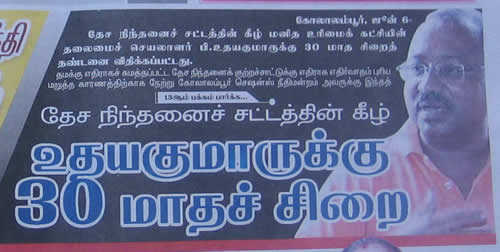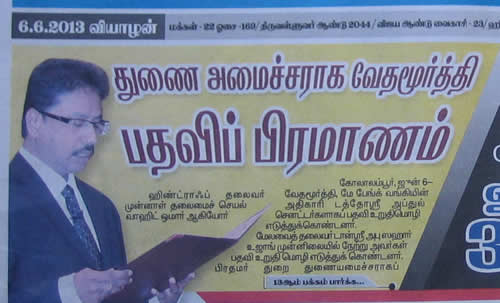JUNE 8 – It is unfathomable, absurd almost, how Zulkifli Noordin was not in the slightest reprimanded for his seditious remarks against Indians while P. Uthayakumar has been slapped iclwith a 30-month jail sentence.

Zulkifli publicly insulted and viciously mocked Hindu-worship idols, inciting anger and hostility among Indians. Uthayakumar in a letter to then British Prime Minister Gordon Brown used the phrase “state-sponsored social ‘ethnic cleansing’ of the Indian poor in Malaysia”.
If one is to weigh and compare the damage done by both parties, Noordin’s would massively outweigh that of Uthayakumar’s.
I am not suggesting the use of the sedition act, but why the selective prosecution?
This grave injustice lies within the implementation of the Sedition Act under which Uthayakumar was charged and prosecuted. While Parliament legislates the law, the Judiciary interprets and applies the law. The Sedition Act 1948 legislated before independence harbours the ultimate purpose of criminalising and prohibiting any discourse deemed seditious in the eyes of the Executive.

According to S 3 of the Sedition Act, a “seditious tendency” is to incite “hatred or contempt” against any Ruler, Government, administration of Justice in Malaysia or Yang di-Pertuan Agong; to promote “feelings of ill will hostility” between different races or classes; and to “question any matter, right or status” regarding the reservation of quotas for Bumiputeras. Hence this Act puts a limit to Article 10 of the Federal Constitution, which provides for a citizen’s fundamental liberty of freedom of speech, assembly and association.
The Federal Constitution, the supreme law of this land, has provided under Article 10 the right to speak. To voice discontent and initiate channels addressing any injustice of the state against its citizens. It is a liberty that is so fundamental for a functioning democracy; it’s a tool to demand the elected government become accountable for its conduct.
Art 10 (1) (a) of the Federal Constitution states that every citizen has the right to freedom of speech and expression but this is subject to Clauses (2), (3) and (4). However only Clauses (2) (a) and (4) are related to (1) (a). Clause (2) (a) states that Parliament may lawfully impose restrictions to the freedom of speech and expression if necessary, made in the interest of national security, or if it may challenge friendly relations with other countries, or disrupt public order or morality, or challenge the privileges of Parliament or lastly, provide contempt of court, defamation or incitement to any offence.
As the de facto leader of HINDRAF, Uthayakumar had written, documented and argued extensively on three Indian issues that demanded national attention. Firstly, the failure to conduct an open inquiry into the Kampung Medan ethnic violence in 2001; secondly the alarming numbers of death in custody cases and police shootings of Indian youths; and the manner Hindu temples were demolished by authorities. He argued that the government was insensitive to the Hindus, Indians were soft targets of the enforcement agencies and justice was compromised for Indians. Was he wrong in concluding that the State was behind a social ethnic-cleansing of the Indian poor in Malaysia?
Having in mind Uthayakumar’s arguments, he has not made any threats involving national security, nor challenge friendly relations with the UK, nor in the least has he disrupted public order or morality nor challenge any Parliamentary privileges nor has he provided contempt of court, defamation or incitement to any offence. Even if he did, there are enough provisions in the Penal Code under which he could be charged and tried. But the government chose the archaic Sedition Act for its arbitrary application instead of the Penal Code. In the former he is guilty even without any intention while in the latter he is innocent until proven guilty based on his conduct and intention.
By criminalising Uthayakumar for his “seditious tendency”, the Courts have hereby criminalised the crux of his course of actions and the fundamentals of what he fought for. His constituents are minority Indians who are marginalised and poor. Punishing him is tantamount to silencing the voice of the poor Indians.
Serving Uthayakumar a 30-month jail sentence for a “seditious” statement is madly disproportionate and without any sense of justice. It merits nothing less except to be condemned.
* Anusha Arumugam is a student reading law.
* This is the personal opinion of the writer. The Malaysian Insider does not endorse the view unless specified. |


